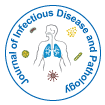The Role of Antibiotic Stewardship in Controlling Multidrug-Resistant Bacteria
Received Date: Jan 01, 2025 / Published Date: Jan 31, 2025
Abstract
The emergence and spread of multidrug-resistant (MDR) bacteria pose a significant global health threat, leading to increased morbidity, mortality, and healthcare costs. Antibiotic stewardship programs (ASPs) play a crucial role in mitigating this crisis by promoting the responsible use of antimicrobial agents, optimizing treatment strategies, and reducing the selective pressure that drives resistance. Effective ASPs incorporate surveillance, infection control measures, and clinician education to improve prescribing practices and minimize unnecessary antibiotic use. Additionally, advancements in rapid diagnostic testing and the development of alternative therapeutic approaches, such as phage therapy and antimicrobial peptides, further support stewardship efforts. Despite challenges such as limited resources and compliance barriers, integrating ASPs into healthcare systems remains essential for controlling MDR bacteria. This review explores the impact, strategies, and future directions of antibiotic stewardship in combating antimicrobial resistance.
Citation: Miasaft K (2025) The Role of Antibiotic Stewardship in Controlling Multidrug-Resistant Bacteria. J Infect Pathol, 8: 280. Doi: 10.4172/jidp.1000280
Copyright: © 2025 Miasaft K. This is an open-access article distributed under the terms of the Creative Commons Attribution License, which permits unrestricted use, distribution, and reproduction in any medium, provided the original author and source are credited.
Select your language of interest to view the total content in your interested language
Share This Article
Recommended Journals
Open Access Journals
Article Tools
Article Usage
- Total views: 619
- [From(publication date): 0-0 - Nov 08, 2025]
- Breakdown by view type
- HTML page views: 497
- PDF downloads: 122
